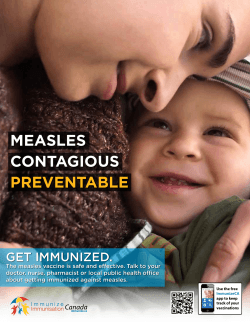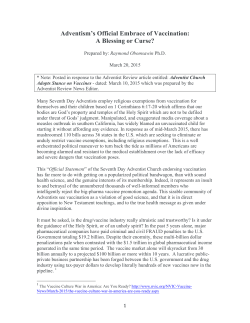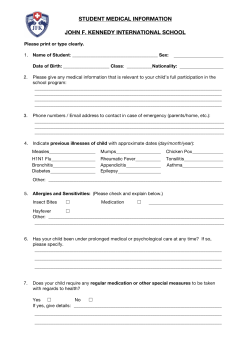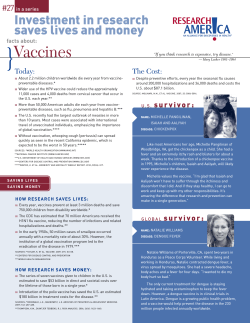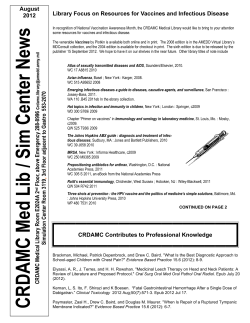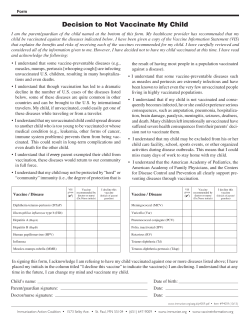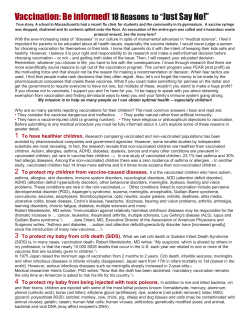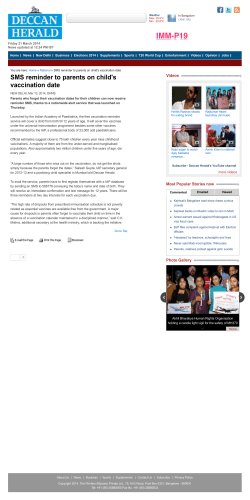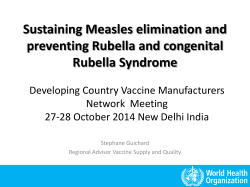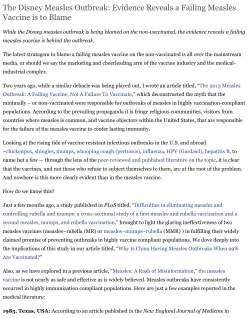
Should I Vaccinate My Child? A Physician’s Perspective
Should I Vaccinate My Child? A Physician’s Perspective Bruce Gellin, MD, MPH Executive Director National Network for Immunization Information The Gates Children’s Vaccine Program asked Dr. Gellin, an infectious diseases physician and head of the National Network for Immunization Information, to talk to us about childhood vaccination. Here is what he had to say: What is your position on the current media controversy surrounding childhood immunizations? As a physician and as a parent, what do you advise people to do? Well, first of all, it’s important to note that there is no scientific controversy about the effectiveness and safety of vaccines. We know that vaccines are some of the best tools modern medicine has to fight a number of killer diseases. And we look forward to being able to offer vaccines to children that will be effective against ear infections, respiratory infections and diarrheal infections. In addition, vaccines that prevent AIDS, hepatitis C, malaria, tuberculosis and a number of other serious infectious diseases are currently in the development pipeline. The National Network for Immunization Information’s position on childhood immunizations is simple. We believe that immunizations are one of the most important ways parents can protect their children against serious infectious diseases. Organizations like the American Academy of Pediatrics, the American Academy of Family Physicians, and the independent expert Advisory Committee on Immunization Practices also clearly recommend childhood vaccination. Look at their websites if you have any doubts. Studies have proven that vaccines are very safe. And the small risks associated with vaccination are being reduced through ongoing medical advances and through constant monitoring of our national vaccination program. But we also recognize that vaccination recommendations are not chiseled in stone. They are based on the best information available. When new information challenges existing policy, policies are reviewed and reassessed. For example, just last fall the recommendation for the polio vaccine was changed from a schedule that included the live, oral vaccine to a schedule that now includes only inactivated polio vaccine. The purpose of this change was to further reduce the already slight risk of developing polio from the live vaccine. Due to the success of immunization, polio has been eradicated from the Western hemisphere, so even the slight risk of developing polio from the oral polio vaccine (less than one case for every six million doses) is now seen to be unacceptably high compared to the zero risk of becoming infected naturally. The situation changed, so the policy changed. As far as the general public is concerned there isn’t really a controversy about childhood immunization either. We interviewed many parents of young children last spring. The overwhelming majority of them—nearly 90% —believe that vaccines are extremely important for protecting their child’s health. I feel the same way and did not hesitate to immunize my own child. ...it’s important to note that there is no scientific controversy about the effectiveness and safety of vaccines. We know that vaccines are some of the best tools modern medicine has to fight a number of killer diseases. So among most doctors and scientists there is no controversy. What has happened—and the reason you ask this question—is that there is a vocal minority of people who oppose immunization because of misperceptions that vaccines may cause more harm than good. While no medical product, including a vaccine is perfectly effective and perfectly safe, I feel that the “safety” argument is flawed since it is based on anecdote and hypothesis rather than science. ...there is a vocal minority of people who oppose immunization because of misperceptions that vaccines may cause more harm than good. I feel that the “safety” argument is flawed since it is based on anecdote and hypothesis rather than science. It’s ironic that this “controversy” comes after we have begun to control, and even eliminate, diseases that just a generation ago sent fear through the community. Now those diseases are memories, not concerns, and the reason is simple—we have protected ourselves, our families and our communities as a result of the use of effective and safe vaccines and immunization strategies based on our understanding of the epidemiology of the diseases. But science does not have answers to all a medical questions, such as why a baby dies of Sudden Infant Death Syndrome (SIDS), why a child develops autism or why people develop autoimmune diseases. It is human nature to try to make sense of what happens to us. It is not surprising that when a serious medical problem follows a vaccine, there is a tendency to assume cause and effect. However, it is only through well-designed epidemiologic studies that we can look at patterns of illness to establish cause and effect. That’s what makes the most scientific sense. Imagine what the practice of medicine would be like if our treatments were based on anecdotes rather than rigorous science! As I said earlier, I don’t believe that we have a national controversy over immunization, but this climate of misinformation has provided the medical community with a clear signal that we need to communicate all that we know about vaccines. I have little doubt that if we do this effectively, informed parents will reach the same conclusions that health care providers and independent expert committees have about the benefits of the vaccines to both individual and community health. What do parents need to know to make these decisions? It’s important for parents to know that there are small risks associated with immunization, but they also need to know the risk and possible consequences of an unprotected child becoming infected with a vaccine-preventable disease. Many of today’s parents have never seen a child with measles, for example, and may think of it as just a mild childhood disease. However, before the vaccine became available, 48,000 children were hospitalized and 3,000 died in the U.S. every year from measles. Following the introduction of measles vaccines in the 1960s, measles cases and deaths were on the decline. Then, in 1989-1991, we suffered a prolonged measles outbreak with over 55,000 cases reported, more than 11,000 hospitalizations and 125 deaths—all because we let down our guard and didn’t immunize as we should have. According to a study from the Centers for Disease Control and Prevention (CDC) last year, the risk of a non-vaccinated child becoming infected with measles today is 35 times higher than for a vaccinated child. And it is not only that unimmunized child who is at risk—diseases that begin among those who choose not to be immunized can become epidemic in the community at large. Parents need to know these facts, and balance the risk of disease and its complications against the very small risk of problems associated with vaccines. In the case of the measles vaccine, 5-15 percent of children vaccinated may experience a short-term fever or rash. In extremely rare cases, a vaccinated child can suffer an allergic reaction or shock, but the best estimate we have is that there have been only 11 cases of shock attributed to measles vaccine in the past 10 years. Over 70 million doses of the measles vaccine were given during that period! In contrast, for every 1,000 children who get measles, one will develop encephalitis (inflammation of the brain). Although 1 in a 1,000 might sound like a small number, remember that the measles virus is one of the most contagious viruses that exists and, before there was a vaccine, virtually all children were exposed to it. So if we stopped vaccinating against measles, the impact of the complications would be enormous. We believe that presenting parents with these facts will help them understand better why experts make the recommendations they do. Until we are sure that a contagious virus like measles has been eradicated worldwide, we still need to vaccinate our children. Why are some infectious diseases “coming back” now? Is it real or is it hype? In the cases of re-emergence of infectious diseases that are effectively prevented by vaccination, there’s generally a very simple explanation: infectious diseases have are able to find those who remain susceptible, primarily those who are not protected by immunization. For example, the breakup of the Soviet Union resulted in the collapse of childhood vaccination programs in many of the former states—they have witnessed epidemic levels of diphtheria over the past several years. In the Netherlands, since April of last year they’ve had an epidemic of over 2,300 cases of measles—97% of those children were not vaccinated. A study that was published in the Lancet in 1998 found that countries with low pertussis (whooping cough) vaccine coverage had rates of pertussis that were 10 to 100 times higher than in countries with good pertussis coverage. Sweden for example, had a lower vaccination rate and had 100 times more cases of pertussis than Norway. This makes sense because the bacteria and viruses that cause these diseases still exist and children can be exposed at any time. Children who are not protected are at risk. We have less disease now because we vaccinate, not because the infectious agents have gone away. And when the immunization rates fall, the rates of disease rise—it’s been demonstrated over and over, worldwide. So, based on these facts, my advice to parents is to immunize their children fully and on time. The sooner they are protected from vaccine preventable diseases, the sooner you can be sure that the diseases that were once referred to as the “usual childhood diseases” will no longer be usual. Are parents asking more questions? Are doctors worried that some parents are not vaccinating their children? What are doctors doing about this? Physicians around the country tell us that patients are asking more questions about immunizations, but they are asking more questions about all sorts of other things as well. This is good since it provides doctors with an opportunity to inform patients about vaccines and to promote a more open dialogue about health issues in general. ...the bacteria and viruses that cause these diseases still exist and children can be exposed at any time. Children who are not protected are at risk. In the Netherlands, since April of last year, they’ve had an epidemic of over 2,300 cases of measles—97% of those children were not vaccinated. There are a number of different groups who oppose immunization, and they have their own stated agendas, which can be more or less political. I won’t presume to speak for them. What I do know as a physician is that organizations or individuals that spread false information about vaccines, which results in people not vaccinating their children appropriately, are potentially placing children and communities at risk of disease. ...organizations or individuals that spread false information about vaccines, which results in people not vaccinating their children appropriately, are potentially placing children and communities at risk of disease. Certainly there are doctors who are concerned when parents don’t want their children vaccinated. However, my guess is that they only become alarmed when patients are not willing to listen to the scientific evidence and are motivated by anecdotal, non-scientific stories that they’ve seen on television or read in a newspaper or on the internet. Doctors are trained to apply the best available scientific evidence to determine the best course of care. The overwhelming medical evidence shows that vaccines are the best way to prevent serious infectious disease. So when parents make decisions based on faulty information, doctors become worried. What we can do as health professionals is provide our patients with useful, understandable materials that explain the benefits versus the risks of any health intervention in clear terms. Our organization, the National Network for Immunization Information, is doing exactly this—helping doctors, nurses, and others who administer vaccines to understand their patients’ concerns and communicate more effectively on this subject. We are creating materials for clinicians to use to help them do this better, which will be tested by practicing physicians and nurses this spring. We hope to be able to distribute them to thousands of practitioners within the next year. We’re also building a website that will incorporate all the latest and best scientific information on vaccines, so that the public, health care providers, and legislators who make decisions on vaccine mandates can find any information they need on the subject easily. Our website address is www.idsociety.org/vaccine/. The objective then is for all of us to truthfully and adequately address the concerns and questions of our patients. They are seeking our best advice and judgment, so we should provide it. January 2000
© Copyright 2025
